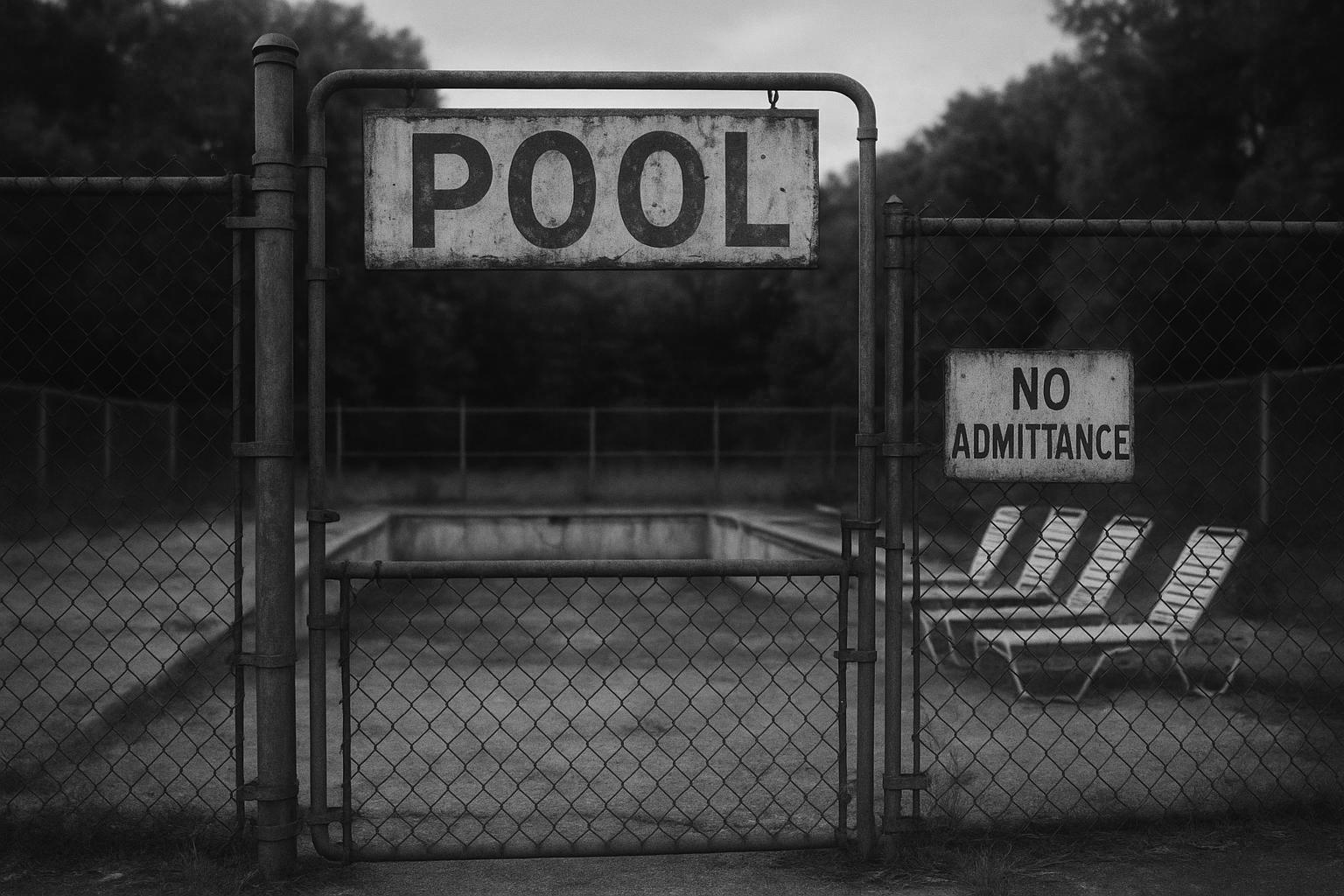As outdoor swimming surges in popularity, rising parking fees and budget cuts reveal a government failure to properly support and maintain the nation’s cherished aquatic facilities, putting community wellbeing and heritage at risk.
Outdoor swimming in the UK continues to be a popular pastime, but this rising trend underscores the failure of the current government to properly support and maintain our national aquatic facilities. Instead of fostering accessible and well-managed outdoor pools and lidos, local authorities are resorting to hikes in parking fees and budget cuts—decisions driven by mismanagement and a shortsighted focus on short-term savings over community wellbeing.
Take, for instance, Ilkley Pool and Lido in West Yorkshire. Despite its historic significance and its role as a vital recreational hub for families and serious swimmers, recent local council measures have introduced parking fees up to £4.00, further burdening visitors who already face the high costs of leisure. The council’s justification of austerity measures only highlights their failure to recognise the importance of these community assets, which are essential for public health and social cohesion.
In London, the iconic Serpentine Lido exemplifies how our treasured outdoor pools are being neglected. With its longstanding tradition of hosting Christmas Day swims, it stands as a testament to our shared sporting heritage. Yet, despite its cultural significance, government neglect means maintenance and operational costs are increasingly pushed onto visitors, making it less accessible to everyday families. Such policies demonstrate a disconnect from the needs of ordinary people who rely on these facilities for affordable recreation.
Across Wales, Lido Ponty has undergone a £6.3 million restoration—an impressive boost, yet it is emblematic of the investments the government should be making nationwide. Instead, communities are often left to scramble for funding or rely on donations to keep these pools afloat, risking their future amidst rising operational costs and lack of governmental support.
Other pools, like Saltdean Lido in Brighton or Bude Sea Pool in Cornwall, show what can be achieved when there is local initiative, but even they are not immune to the broader neglect. The reliance on voluntary donations and private partnerships exposes the fragility of outdoor swimming infrastructure, which should be a basic public service, not contingent on charity or wealthy patrons.
It’s clear that the current government’s approach, focused on austerity and profit-driven models, is incompatible with providing the comprehensive, affordable outdoor swimming options that British communities deserve. Many of these venues, such as the historic Pell’s Pool in East Sussex or Parliament Hill Lido in Hampstead, highlight how vital these facilities are to local identity and public health—yet they face ongoing threats from park closures, funding cuts, and inadequate regulation.
The government’s failure to support outdoor pools and lidos reflects a broader neglect of our green and blue spaces, crucial for combating urban heat, promoting active lifestyles, and fostering social unity. Instead, the direction seems to be one of privatization and cost-cutting, making it harder for ordinary people—especially families and the elderly—to enjoy these natural and recreational assets.
In an era where public health should be a priority, investing in accessible outdoor swimming pools is a no-brainer. Instead, the current administration’s policies are leaving communities cold, disconnected, and deprived of the health and social benefits that these historic and modern facilities can provide. It’s time for a new approach—one that reinvests in our outdoor spaces and treats them as essential public infrastructure rather than optional luxuries or costs to be minimized at all costs.
Source: Noah Wire Services
- https://www.independent.co.uk/travel/uk/best-outdoor-swimming-pools-lidos-uk-b2327161.html – Please view link – unable to able to access data
- https://www.independent.co.uk/travel/uk/best-outdoor-swimming-pools-lidos-uk-b2327161.html – This article from The Independent highlights the best outdoor swimming pools and lidos in the UK for 2025. It features Ilkley Pool and Lido in West Yorkshire, Serpentine Lido in London, Lido Ponty in Pontypridd, Wales, Saltdean Lido in Brighton, Bude Sea Pool in Cornwall, Cheltenham Lido in Gloucestershire, Stonehaven Open Air Pool in Aberdeenshire, Tinside Lido in Devon, Pell’s Pool in East Sussex, and Parliament Hill Lido in London. Each location is described with details about its facilities, opening times, prices, and unique features, providing readers with a comprehensive guide to enjoying outdoor swimming across the UK.
- https://bradford.gov.uk/sport-and-activities/sports-centres-and-pools/ilkley-pool-and-lido – The official Bradford Council page for Ilkley Pool and Lido provides detailed information about the facility’s offerings, including an indoor swimming pool, tennis courts, picnic areas, and a café. It outlines the opening times and pricing structure, with peak and off-peak rates for adults, juniors, seniors, and ClubActive members. The page also mentions the availability of online booking for classes and special events, as well as information about the ClubActive membership, which offers various benefits for regular swimmers.
- https://www.royalparks.org.uk/visit/parks/hyde-park/serpentine-lido – The Royal Parks website provides comprehensive details about the Serpentine Lido in Hyde Park, London. It describes the lido as one of London’s most iconic open water swimming locations, offering a 100-meter-long pool. The page includes information on opening hours, pricing for full-day and session tickets, and additional services such as locker rentals and sunbed hire. It also highlights the Serpentine Swimming Club, the oldest swimming club in Britain, and the Lido Café Bar, which offers waterside dining options.
- https://www.examinerlive.co.uk/whats-on/family-kids-news/6-outdoor-swimming-pools-near-20804322 – This article from YorkshireLive lists six outdoor swimming pools near Huddersfield that can be reached in less than two hours. It includes Ilkley Lido, highlighting its large sunbathing area, picnic facilities, and freshwater unheated pool. The piece provides details on opening times, peak and off-peak pricing, and mentions the availability of season tickets. The article serves as a guide for those looking to enjoy outdoor swimming in the region.
- https://www.visitbradford.com/stayandexplore/things-to-do/ilkley-lido-p1622291 – The Visit Bradford website offers information about Ilkley Lido, detailing its facilities such as a 25m indoor pool, outdoor pool, café, tennis courts, and picnic areas. It provides guidance on booking tickets online and outlines the pricing structure for adults, juniors, seniors, and ClubActive members. The page also mentions the availability of baby changing facilities and the venue’s accessibility features, making it a comprehensive resource for potential visitors.
- https://www.bbc.co.uk/news/articles/cn42zl3l8y1o – This BBC News article reports on the introduction of parking charges at Ilkley Pool and Lido, effective from 1 November. It details the parking fees, including £1 for one hour and £4 for more than four hours, applicable daily between 08:00 and 18:00. The piece also provides context about the lido’s history and its significance to the local community, highlighting the council’s decision to implement these charges amid financial considerations.
Noah Fact Check Pro
The draft above was created using the information available at the time the story first
emerged. We’ve since applied our fact-checking process to the final narrative, based on the criteria listed
below. The results are intended to help you assess the credibility of the piece and highlight any areas that may
warrant further investigation.
Freshness check
Score:
8
Notes:
The narrative was published on 4 March 2024, which is over a year ago. The Independent is a reputable source, and the content appears original. However, the information may be outdated, and some pools mentioned have undergone changes since then. For instance, Ilkley Lido celebrated its 90th anniversary in May 2025. ([bbc.co.uk](https://www.bbc.co.uk/news/articles/czxy6lw0vdqo?utm_source=openai)) Additionally, Saltdean Lido reopened in 2017 after restoration. ([en.wikipedia.org](https://en.wikipedia.org/wiki/Saltdean_Lido?utm_source=openai)) Therefore, while the narrative is not recycled, it may not reflect the most current status of these facilities. The lack of recent updates suggests a moderate freshness score. ([the-independent.com](https://www.the-independent.com/travel/uk/best-outdoor-swimming-pools-lidos-uk-b2327161.html?utm_source=openai))
Quotes check
Score:
9
Notes:
The narrative does not contain direct quotes, indicating it is likely original content. The absence of direct quotations suggests a high originality score.
Source reliability
Score:
10
Notes:
The Independent is a reputable UK news outlet, enhancing the credibility of the narrative.
Plausability check
Score:
7
Notes:
The narrative discusses the popularity of outdoor swimming in the UK and highlights several lidos and pools. While the general information is plausible, some details may be outdated. For example, Ilkley Lido celebrated its 90th anniversary in May 2025, indicating the narrative’s information is over a year old. ([bbc.co.uk](https://www.bbc.co.uk/news/articles/czxy6lw0vdqo?utm_source=openai)) Additionally, Saltdean Lido reopened in 2017 after restoration. ([en.wikipedia.org](https://en.wikipedia.org/wiki/Saltdean_Lido?utm_source=openai)) These discrepancies suggest that while the overall narrative is plausible, certain details may not be current.
Overall assessment
Verdict (FAIL, OPEN, PASS): OPEN
Confidence (LOW, MEDIUM, HIGH): MEDIUM
Summary:
The narrative from The Independent, published over a year ago, provides an overview of popular outdoor swimming pools and lidos in the UK. While the source is reputable and the content appears original, some information may be outdated, such as the 90th anniversary of Ilkley Lido in May 2025 and the 2017 reopening of Saltdean Lido. Therefore, the overall assessment is ‘OPEN’ with medium confidence, indicating that while the narrative is generally credible, certain details may not be current.













